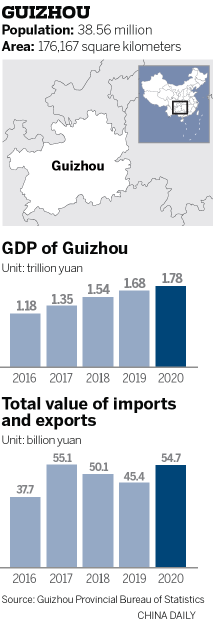Guizhou banks on high tech for future

A panoramic view of the Five-hundred-meter Aperture Spherical radio Telescope (FAST) in Pingtang, Guizhou province. It is nicknamed Tianyan, or the Eye of Heaven, by amateur astronomers. CHINA DAILY
As the bell rang at noon across the campus of No 9 Middle School in Tongren, Guizhou province, students swarmed to the canteen, eager to enjoy their big lunch: braised eggplant; pork with green peppers and bamboo shoots; stewed cabbage; braised pork with potato; cucumber soup; and rice.
Every day, the canteen is responsible for serving more than 1,600 students, and it places orders on a big data platform every morning to source more than 30 kinds of fruits and vegetables from local farmers and agricultural cooperatives.
The big data platform helps bring produce directly from farms to students' dining tables while boosting the incomes of local residents. Every part of the process is photographed and uploaded to the "School Agricultural Cloud" for tracking, which helps ensure food safety, said Liu Xingguo, vice-principal of the school.
The platform was developed by the Guizhou Shanjiuchangqing Smart Cloud Company. The platform has been used in more than 15,000 schools across China and has connected nearly 4,000 agricultural companies and cooperatives to serve more than 4.85 million students.
It serves as an example of how Guizhou, once an impoverished region, is using high tech to develop new industries and build a prosperous future.
Nestled in a mountainous region, Guizhou has been leveraging its unique climate and environmental advantages to develop the "four systems"-new industrialization, new urbanization, agricultural modernization and tourism industrialization.
Now, at the Guizhou Big Data Application Exhibition Center, people can talk with robots about the wonders of 5G and ride an autonomous bus at the Chery Wanda Guizhou Bus factory. At the Sinopharm Group Tongjitang (Guizhou) Pharmaceuticals plant, an intricate machine, in clockwork fashion, is churning out a remarkable 6,500 capsules of traditional Chinese medicine per minute.
In February, President Xi Jinping underlined the importance of innovative and green development in Guizhou. He urged local officials to step up efforts to implement the new development philosophy and build the new development paradigm of "dual circulation" based on the requirements of the new development stage.
Xi also called on the province to give equal importance to development and environmental protection and coordinate efforts in both development and security to seek high-quality growth.
He expressed hope that Guizhou will blaze a new path for the country's western development campaign in the new era, make a good start in rural vitalization, take advantage of the opportunity to implement the digital economy strategy and make greater achievements in environmental conservation.
Shen Yiqin, Party secretary of Guizhou, said, "We will pursue high-quality development in all aspects and fields… firmly adhere to the two bottom lines of development and ecology, coordinate development and safety work and solidly promote rural vitalization, the big data industry and ecological development."
The plan follows Guizhou's recent eradication of some of the country's most entrenched poverty. All 9.23 million poor people living in rural parts of the province in 2012 had shaken off that plight by the end of last year, with almost 2 million of them having moved out of isolated mountain villages, official data shows.
According to Shen, Guizhou is now embarking on a greener development path. The province will focus on the vitalization of 10 major industrial industries and further promote the deep integration of big data, the real economy and the development of high-end, green and intensive industries.
Last year, the total industrial output value in Guizhou hit 1.4 trillion yuan ($217.7 billion), marking an increase of nearly 1 trillion yuan from the data in 2010. Such a stride made the past decade the fastest period of industrialization in the history of the province and could provide a relatively sound foundation for further industrial and green upgrades in the future.
Guizhou has seen rapid development in its big data industry, for example. The province has a cool climate, so data centers save money on electricity costs normally accumulated from air conditioner usage. In addition, Guizhou has seldom been hit by big earthquakes with its steady geological structure, which provides a safe, external environment for data.
Based on these unique climate and geological advantages, Guizhou is striving to become a big data hub. In February 2016, the province was approved by the Ministry of Industry and Information Technology and the National Development and Reform Commission to establish China's first national big data comprehensive pilot zone.
So far, more than 5,000 big data companies have been set up in the Guian New Area, the national-level urban area in Guiyang, the provincial capital.
In the coming five years, Guiyang and Guian will pour more resources into the development of three industrial clusters centering on big data, electronic information manufacturing and software and information technology services, said Wu Hongchun, director of the Guiyang bureau of big data development and management.
These clusters, each of which will be worth at least 100 billion yuan, are important drivers for strengthening the core competitiveness of both the digital economy in the city and the new area, she added.
Specifically, Guian plans to create a hub of 12 mega data centers and 4 million servers with a fixed-asset investment of over 40 billion yuan by 2025.
"The province will continue to leverage the digital economy to offer important engines for the upgrade and transformation of traditional industries," said Tao Changhai, Guizhou's vice-governor.

China Daily
























